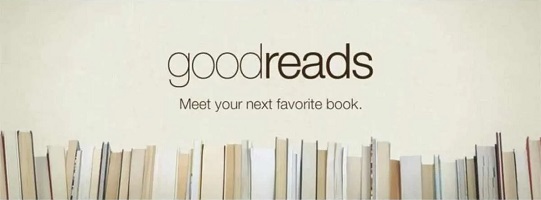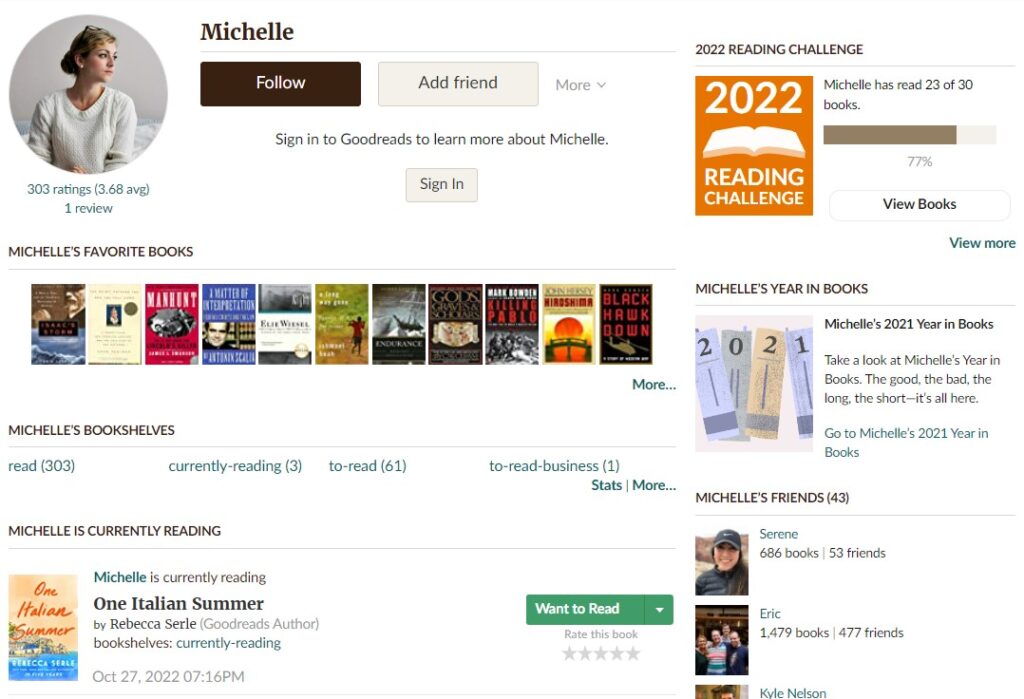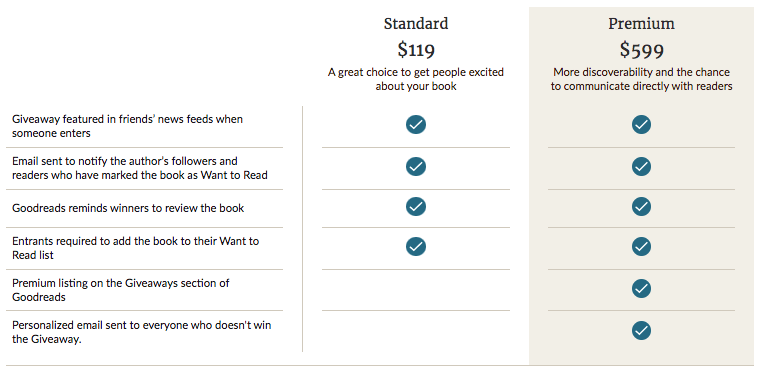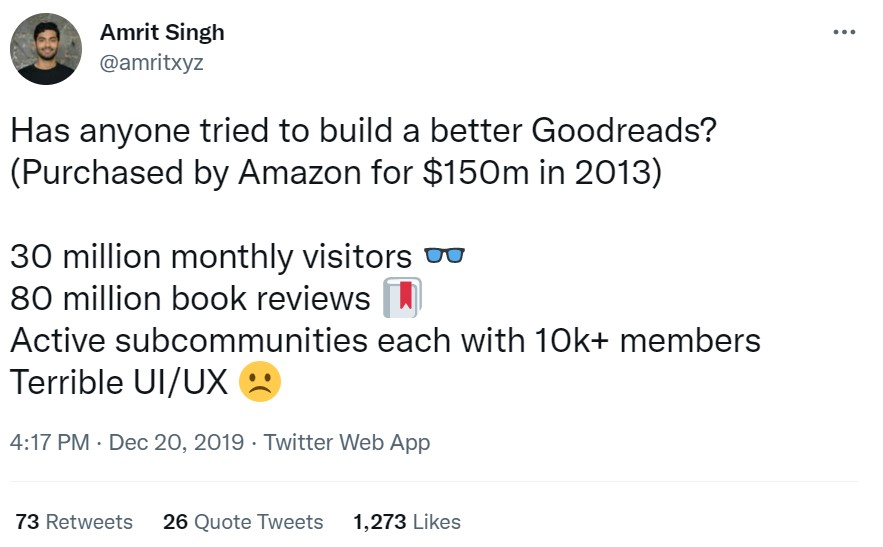Goodreads: A Platform for Readers and Authors

Goodreads is a platform with over 125 million members and 3.5 billion books which enables readers to find new books, rate and review past reads, receive personalized reading recommendations, and engage with friends and authors.
In 2017, I set a personal goal to read 50 books during the year. But I quickly ran into some frustrations. First, it was hard to find new books to read—50 books is a LOT of books. Second, it was hard to vet books in advance. When you’re racing through 50 books, a bad book that’s a slog to get through can throw you dangerously off schedule. And third, I didn’t have good ways of tracking what I had read. I built an Excel tracker but it took too long to fill out and so I often didn’t.
A friend then told me about Goodreads.
Goodreads is a platform for authors and readers with over 125 million members. Users search its massive database of 3.5 billion books to find new books and rate and review books they’ve read. Goodreads uses users’ rating data to provide personalized recommendations on what to read next. Comment boards for each book, forums, and contests create spaces for readers to engage and create communities. Users can follow each other, allowing users to stay up-to-date on what their friends are reading.
It’s also an invaluable space for authors. Goodreads allows authors to register for special accounts that mark them as such and provide special privileges on the site. They can engage directly in conversation with readers about their books, run marketing campaigns, publish blog posts, track their audience using a dashboard and easy-to-use tools, and curate a fanbase.

Goodreads was acquired by Amazon in 2013, who recognized that it represented both a significant threat to and opportunity for Amazon’s own literary business. With this deal came valuable new functionality: Goodreads users could seamlessly purchase books on Amazon.com and Amazon Kindle devices came with Goodreads automatically installed. In real time, a Kindle reader could now post quotes, notes, and progress on their readings to their Goodreads account.
The Amazon acquisition also brought a critical development: revenue. Goodreads today has three primary revenue streams: affiliate links, targeted ads, and giveaways.
Affiliate Links: Since its early days, Goodreads had captured some revenue from affiliate links: users could easily purchase books they discovered from Goodreads through bookstore websites like Barnes and Noble and Amazon, with some small commission collected by Goodreads. The deep integration of Amazon and Goodreads meant more affiliate revenue and likely also higher per-purchase commissions (though this is personal speculation).
Targeted Ads: Amazon also helped Goodreads launch more sophisticated advertising programs. Unlike other websites and apps, the ads on Goodreads are only for books. Users are occasionally suggested sponsored books to read, which are targeted based on the user’s reading preferences. For example, a reader who enjoys Agatha Christie novels might see a suggestion on their feed for a newly released mystery thriller from Penguin Random House.
Giveaways: In 2020, Goodreads launched a program that allows authors or publishers to run book giveaway campaigns of up to 100 books through its platform, charging $119 for its Standard package and $599 for Premium on top of the cost of the free books. The program is highly attractive to sellers; Goodreads claims that over 40,000 users register for Giveaways every day.

This brings us to the question of Goodreads’ sustainability and scalability. Competing platforms (e.g., The StoryGraph, LibraryThing, Anobii, etc.) have launched in the last decade, many of which closely mimic Goodreads’ features. But I don’t believe that any of these platforms represent a meaningful threat to Goodreads’ long-dominant market position. Goodreads’ user base, massive book database, and synchronization with Amazon are competitive advantages that will continue to afford it a wide strategic moat.
The company’s actions seem to support this view: Goodreads has long been teased/chided for having a remarkably outdated and frankly terrible UX. But despite this consistent and loud feedback, it has apparently made no investments in the platform experience since the early 2010s. And why not? Because they’re a monopoly. Why invest in platform improvements if you have a captive audience with no meaningful alternatives?

Goodreads’ growth strategy is less predictable. Their primary focus so far has been on English language books, readers, and authors, but the platform does already have foreign language assets and capabilities. It’s unclear what’s holding them back from more aggressively pursuing other audiences, though it seems likely that they’ll be similarly successful when they do.
Sources:
- https://wayback.archive-it.org/all/20141004075809/http://phx.corporate-ir.net/phoenix.zhtml?c=176060&p=irol-newsArticle&ID=1801563&highlight=
- https://bookriot.com/how-does-goodreads-make-money/
- https://help.goodreads.com/s/article/What-are-Goodreads-Giveaways-1553870937414
- https://help.goodreads.com/s/announcements/a031H00000RKE8VQAX/giveaways-for-authors-frequently-asked-questions?ref=kdpnl
- https://www.sfwa.org/2013/12/30/goodreads-tools-authors/
- https://rigorousthemes.com/blog/best-goodreads-alternatives/
- https://uxdesign.cc/why-has-no-one-made-a-better-goodreads-dfc9cb9e149a



Thanks for the post! Actually, before reading this post, I always wondered why GoodReads had a horrible-looking webpage and UX. But after you mentioned they’re a monopoly, things totally make sense. I think the unfortunate thing is that even though they are the only provider of this service (even a service I would WANT to use), because the UX is bad, I just never bother and instead go on the subreddits where people read the same genres that I read. I wish they’d understand that even though they have the largest market share on this service, they are still missing out so many other potential users because of the lack of UI/UX investment.
Totally! Their behavior makes me think that they’re not *that* interested in growth, or at least rapid growth, so they don’t care if they leave some users behind if it means saving money on investments in UI/UX. And I’d probably bet that this mindset comes from the fact that they’re a postage stamp within Amazon. If they hadn’t been acquired, they’d probably be running the company very differently.
I still struggle to understand the value of GoodReads (to be read, I use it, but I would not pay for using the app). I use it as a way of keeping track of the books I read and more importantly the books I want to read + to quickly find reviews for books I hear of or that are recommended to me. I am curious, given the introduction of your blog, are you using it for book recommendations as well? Also, I wonder how Amazon is using all the data GoodReads is generating for them – could put them at a huge advantage with publishing houses…
Thank you for the blog post, Michelle.
It seems one of Goodreads’ significant value propositions is the ability to source a critical mass of book reviews from avid readers. My question is – how does Goodreads ensure the people who are rating books and posting reviews actually read the book? With such a large membership, Goodreads is likely the most influential book recommendation platform… it’s the perfect target for internet trolls. Although at first glance of the platform, most reviews seem legitimate, there have been complaints in the past that some members post reviews before a book has even been distributed. Similarly, some book reviews barely mention the book, but are instead responses to controversial social positions authors have taken (e.g. the reviews of the Harry Potter series). In order for Goodreads to remain a scalable and sustainable market leader, it needs to uphold the integrity of the platform in order to enhance trust in the quality of a stranger’s reviews. Otherwise, what’s preventing a member from leaving the service and joining a neighborhood book club?
Such a good point! When researching for this post, I actually came across some articles that mentioned the exact same issue.
Check out this article from Time: “How Extortion Scams and Review Bombing Trolls Turned Goodreads Into Many Authors’ Worst Nightmare” https://time.com/6078993/goodreads-review-bombing/
From what I can find, it doesn’t seem like Goodreads or Amazon has had a great response and done that much to prevent the issue. They expect users to follow a code of conduct and take down posts that obviously violate it, but it doesn’t seem like authors are that satisfied with the quality of response. I guess it’s another benefit of being a virtual monopoly…
Hi Michelle,
Thank you so much for this blogpost! I did not know Goodreads existed before reading this post.
I am wondering if they are reluctant to change the UI/UX experience, because so many of their loyal customers are already used to it and might not want to get used to a new interface. It is interesting to see that the users they have seem to stay with them even if they do not try to improve the user experience. It seems to me that the switching costs for users are quite high, as the recommendations would get better over time. On top of that if users use the platform to keep track of what books they read, it would be a pain to type in this information on a new platform. In terms of scalability I would therefore see an opportunity to build a platform with better UI/UX in a new geographical market which speaks a different language for example.
For Goodreads, I am wondering if focusing on existing users is a disadvantage long term. If they attracted the same kind of readers for example, they would miss out on capturing value on new categories of books and readers that were invented/developed. This would also mean that they become less diversified over time, which could influence the quality of their recommendations, or at least only make it usable for a specific customer group in my opinion.
Hi Kate! The switching cost point is a great one. For avid readers, the exercise of logging and recording hundreds–sometimes thousands– of books you’ve previously read is something you’re only willing to undertake once. Goodreads knows it has a captive audience and that the competitive sites are pretty poor, so they underinvest in ways that other businesses could never afford to.
With regards to your concern about diversity, I’ve been absolutely floored by the diversity of books on Goodreads. I don’t know how they built their book database but it really seems infinite. Any book I’ve searched–historic, self-published, ultra niche, you name it–somehow exists within their database.
Where diversity of users becomes an issue is in the ratings system. Most people read fiction, so those books tend to have the most ratings (and often inflated ratings). But it doesn’t impact the experience much if at all for folks who don’t read popular fiction.
Thank you for posting, Michelle! As someone who loves to read I’ve heard about and always been curious about Goodreads but have not yet signed up…
In terms of the sustainability and durability of the platform in general, I also wonder if one of major constraining factor is customers’ demand or “willingness to pay” for books in general. In many ways, I view Goodreads and some other reading platforms (my favorite is Readwise) as offering complementary value to the reading experience – i.e. they help users gain more value from any reading that they do. At the same time, with such sharp decline in reading and rates of purchase for books in the United States, I wonder if Goodreads will find itself trying to capture value from a continuously declining pool of engaged readers…
Book readership is definitely declining, but I actually think that platforms like Goodreads have increased the engagement and activity of the people who choose to remain readers. Discussion groups, virtual book clubs, and virtual opportunities to talk directly with authors through Goodreads transforms the experience of reading into something more active and exciting.
Further, Goodreads does a good job of enticing people to read more than they might have otherwise through its recommendations and ads, and through heavy emphasis on setting reading goals. Your reading goal (usually set at the new year) is posted on your profile and progress toward your goal is shared with all of your friends on a regular basis. It creates pretty powerful social pressure/accountability to read more and hit your goal, even if it was overly ambitious!
Thank you Michelle for this post!! I’ve always wanted to organize and manage the books I read / aim to read as well, but have always failed to see the value brought to the table by Goodreads. For starters, I thought there was significant trouble getting started — if I was a new reader or new to Goodreads, I wasn’t sure how to let Goodreads know what books to recommend etc. (or maybe there is a way, I couldnt figure it out). Second, I wouldn’t want to pay for such an app when I could just put a little extra effort and keep track of my books myself.
However, having said that I feel such an app could also be made potentially very useful and user friendly unlocking huge value. That makes me wonder why there aren’t more Goodreads-equivalents in the field?
You should totally join! It’s been a gamechanger for me when it comes to book organization. There’s a pretty easy tutorial to get started that walks you through recording and rating some of the books you’ve read in the past (I think 20 books?). Goodreads then uses those ratings to provide your first recommendations. Every time you add or rate more books to your account, it refines your recommendations.
Also, Goodreads is free!